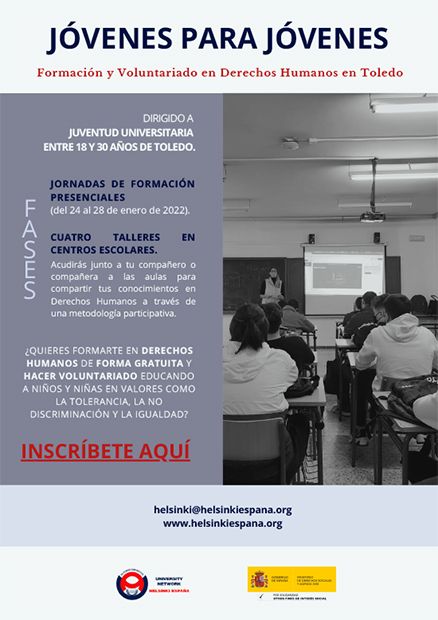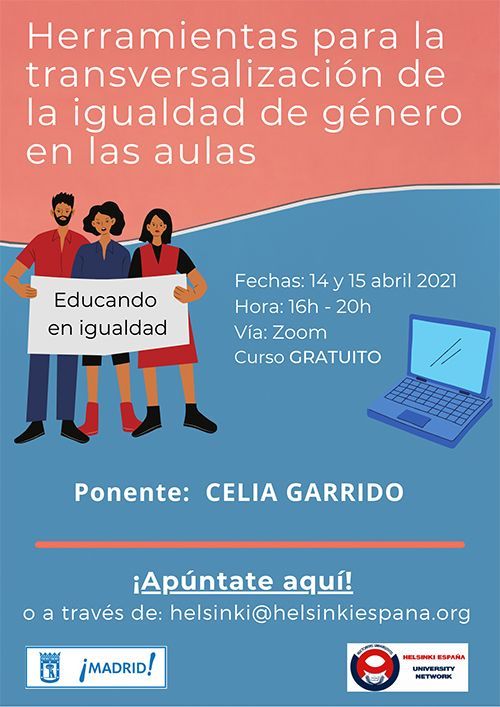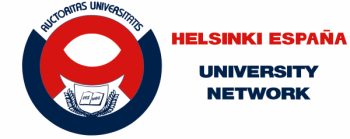
Dec 20, 2021 | Youth to Youth
Youth for Youth is back in Toledo for this 2022, a project supported by the Ministry of Social Rights and Agenda 2030 and aimed at university youth who find in Human Rights education a tool for the promotion of values related to tolerance , equality and respect for diversity.
If you are interested in issues related to the Sustainable Development Goals, mental and emotional health, social exclusion, the migratory phenomenon, gender, bullying and more topics related to Human Rights; If you consider that there is a lack of knowledge about them and you believe that education is the best instrument to change the situation, this is your volunteer service! Through the program “Youth for Youth: Educating in Human Rights and Sustainable Development Goals” you will have the opportunity to learn and teach about these issues to school-age boys and girls.
What is this program about? Once registered, the young volunteers receive in the first phase a week-long training on human rights and SDGs from various experts and civil society organizations. In Toledo, the training will take place between January 24 and 28 at the University of Castilla La-Mancha (Toledo Campus) and various topics will be discussed, all of which are related to human rights. In addition, during the training, strategies and tools will be acquired to adapt this new knowledge to the classroom through participatory dynamics and methodologies.
Are you afraid to go alone? Do not worry! The training also tries to create a learning and meeting space so that young people with the same interests meet and establish links, forming couples with whom they later go to schools. In the second phase, the youth volunteers will go to a classroom in a school in Toledo to transmit the knowledge they have learned to children and adolescents. Couples will carry out 4 sessions in the assigned classroom.
Sign up here: ✍️


Dec 20, 2021 | Youth to Youth
Acting by and for youth, Helsinki Spain has created “Youth for Youth: Educating in Human Rights and Sustainable Development Goals” for more than 20 years. In this Edition, which will take place in Galicia, it has the support of the Ministry of Social Rights and the 2030 Agenda and Xunta de Galicia and the Consellería de Política Social.
This initiative has two phases where in the first, university youth receive an online training course, which will take place between March 21 and 25 in Santiago de Compostela, dealing with topics such as gender equality; mental and emotional health; the environment, sustainability and responsible consumption; bullying, cyberbullying and cybersecurity; the protection of people at risk of vulnerability (migration and refuge, people with functional diversity, homeless people); and the bloc of democracy and participation. Once the training is finished, the university youth transmit their knowledge in pairs, giving 4 awareness sessions, which will begin in the middle of March, in school centers in La Coruña and Pontevedra in person, through a participatory methodology using dynamics and games; working values such as respect, equality and non-discrimination.
In this way, the project contributes to the development of a model of global citizenship and a universal culture of Human Rights in which the participants are more aware of their rights.
“Youth for Youth” is not just a project. It is a great opportunity to learn and teach.
Sign up here: ✍️
We are waiting for you!


Mar 25, 2021 | Youth to Youth
The objective of the course on ‘Gender Equality and Human Rights’ is to provide teachers with the necessary tools to identify inequalities in the educational field, and to develop a non-sexist education that provides values of equality and contributes to overcoming discrimination and social prejudices.
Similarly, this course is aimed at providing the necessary resources to carry out equal educational practices in the classrooms.
To date, we have trained more than 100 teachers in gender equality and human rights.


Oct 21, 2020 | Youth to Youth
Spain continues to lead the ranking of economies with the highest percentage of unemployed youth. According to data from the Labour Force Survey from the Ministry of Employment and Social Security, the unemployment rate for young people aged 16 to 24 is 33,3%.
The low activity rates, the very high unemployment figures, and the precarious working conditions compromise the future of a generation that feels frustrated, condemned to social marginalization, and unable to achieve full autonomy and a future outside of their families.
The youth unemployment rate of Spain is the highest in the EU, with 33% it even surpasses the Greek data (32,5%). Spain also has the worst working conditions for young people.
Moreover, according to the report of labour insertion of the university graduates presented last July (2019) by the Ministry of Science, Innovation and Universities, Spain is one of EU countries where the graduates performed low-skilled Jobs. 37,1% of the graduates in Spain performed these jobs, compared to 23,2%, the European average, according to data from the CYD Foundation report of 2017.
In Spain, 30% of university graduates 4 years after graduating are still unable to find a job. This can lead them to social exclusion after all the work and effort made.
On the 27th of May of 2020, UN news published that the impact of COVID-19 has been disproportionate among the young workers. More than one out of six is unemployed, and the working hours of those who have kept their job have been reduced by a 23%, as claimed by the most recent report of the international institution that deals with labour issues. The report also indicated that the rapid and substantial increase in the young unemployment register since February has affected women more than it has affected men.
El País newspaper reported on the 3rd of June of 2020 that the youth unemployment rate had increased seven-tenths between March and April in the nineteen countries that share the euro. It reached 15,8% and increased eight tenths in the European Union until reaching 15,4%. Date confirms that Spain had the highest youth unemployment rate among the member states for which Eurostat published data in April, the indicator saw a monthly increase of eight tenths, while in year-on-year terms the growth was of two tenths, reaching 33,2%.
The ILO reported that the pandemic will have a triple impact on the young people, not only it destroys their jobs, but also their education and training. Because of this, ILO has demanded “urgent, concrete, and large-scale” political answers aiming to support the youth. The director of the ILO office in Spain, Joaquín Nieto, has warned that this situation is especially relevant for the Spanish labour market, which was already suffering from one of the highest youth unemployment rates in the world. In fact, he believes that Spain “cannot allow a high youth unemployment rate to be installed in a structural manner, which could mean a failure with disastrous long-term consequences for an entire generation”. He then recommended implementing a special Youth Guarantee plan so that young people without a job and without studies are offered a job or a training proposal. At the global level, the general secretary of the ILO, Guy Ryder, has highlighted that if “immediate and significative” measures to improve the conditions of this generation “they could carry the legacy of the virus for decades”
Considering all this data, Helsinki Spain decided to once again re-launch our project “Employment Guidance and Social Collaboration”, with the help of the community of Madrid.
Our project is aimed at young graduates from the community of Madrid who are currently unemployed and under 35 years.
The project is going to take place from September to December 2020.



Oct 15, 2020 | Youth to Youth
We hereby present you Kamal Aldalati, student of medicine at the Universidad de Santiago de Compostela.
He will be with us in the next human rights training session for our project Youth toYouth in Galicia to share with us his testimony and give us a wide perspective and approach to the reality migrants live.
Kamal is a syrian refugee, he used to work as an anesthetist in a hospital until he had to run away from his country because he was at risk of death. His testimony will help young college students who will volunteer with us, to fully comprehend the dimensions of the migratory phenomenon and the right to asylum. Additionally, they will learn key tools to sensibilize about this topic to children in schools.
We still have places available for you to participate in our project!
Sign up: Helsinki@helsinkiespana.org












